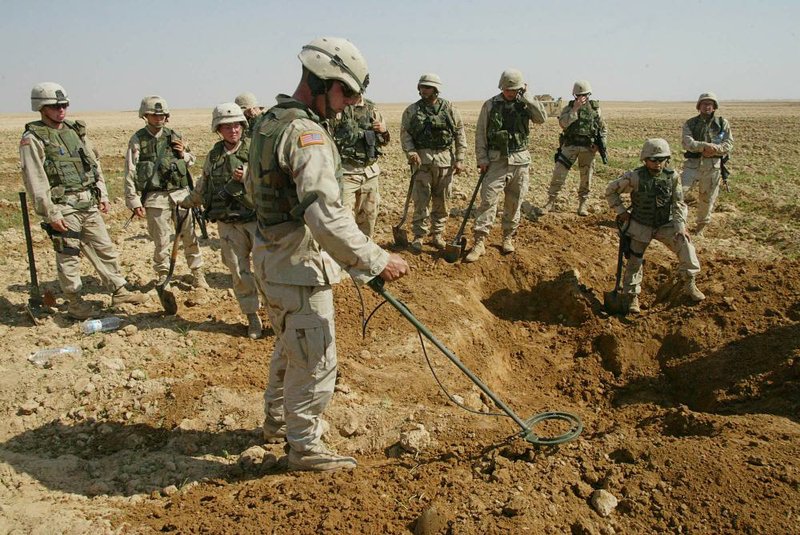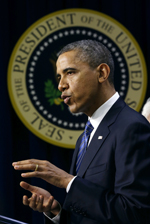President Barack Obama's administration Friday announced measures to reduce and eventually eliminate its stockpile of anti-personnel land mines, with the aim of joining the global treaty that prohibits them.
The announcement, made by a U.S. observer delegation to a conference in Mozambique on the progress of the 15-year-old treaty, was stronger than the previously stated administration position -- that it was studying the treaty's provisions. It appeared to put the United States on a trajectory to signing the treaty, known as the Ottawa Convention.
The U.S. delegation in Maputo, Mozambique, has made it known that it is working toward United States' accession to the Ottawa Convention, National Security Council spokesman Caitlin Hayden said.
The administration did not indicate when the United States would sign the treaty, which President Bill Clinton's administration had encouraged and which most nations have signed.
The U.S. delegation said in a statement read out by the U.S. ambassador to Mozambique, Douglas Griffiths, that the United States would no longer produce or acquire anti-personnel land mines or replace old ones that expire.
The United States has not used land mines since 1991, although it is estimated to maintain a stockpile of 10 million to 13 million of the weapons.
The statement by the delegation, which is led by Steven Costner, the deputy director of the State Department's Office of Weapons Removal and Abatement, said the United States was "diligently pursuing solutions that would be compliant with and ultimately allow the United States to accede to the Ottawa Convention."
Human-rights groups and disarmament advocates who have increasingly criticized the United States for its reluctance to sign the treaty cautiously welcomed the announcement, although they had been pressing for more.
"We are very pleased with the U.S. announcement that it intends to accede to the mine ban treaty, and that it has instituted a new policy banning future production of antipersonnel mines," Stephen Goose, the director of the arms division at Human Rights Watch, who was attending the treaty conference in Maputo, the Mozambique capital, said in a statement.
But Goose, who helped found the International Campaign to Ban Landmines, a group that won a Nobel Peace Prize for its work and is considered largely responsible for the Ottawa Convention, was also critical of the new U.S. position, a view shared by many other disarmament advocates.
"It makes little sense to acknowledge that the weapons must be banned due to the humanitarian harm they cause, and yet insist on being able to use them," he said. "The U.S. should set a target date for joining the mine ban treaty, should commit to no use of antipersonnel mines until it accedes, and should begin destruction of its stocks."
Physicians for Human Rights, another founding member of the International Campaign to Ban Landmines, also issued a qualified endorsement of the U.S. statement.
"The U.S. government's announcement that it will stop producing land mines is a step in the right direction, but we remain concerned about anything less than a full commitment to sign the mine ban treaty as soon as possible," said Widney Brown, the group's director of programs. "The U.S. government has been missing a key opportunity to lead on a groundbreaking agreement that has achieved great success in preventing deaths of innocent victims, including many children."
In an indication that the United States is researching ways to replicate the strategic value of anti-personnel land mines without their collateral damage, Griffiths said in the statement that the U.S. policy included experimental work "to ascertain how to mitigate the risks associated with the loss of antipersonnel land mines."
U.S. defense officials have argued that these weapons have an important purpose -- in deterring ground invasions, for example -- and that the United States would put itself at a disadvantage by renouncing them. Other powerful nations and potential U.S. adversaries -- notably Russia, China and Iran -- have not signed the treaty.
Disarmament advocates have argued that the U.S. reluctance to sign may be dissuading the other recalcitrant nations from joining.
The treaty, which was opened for signature in 1997 and became binding international law in 1999, is regarded as a triumph of the disarmament movement and has sharply reduced the use and destructive effects of anti-personnel land mines.
These weapons, once common but now almost universally regarded as insidious and indiscriminate, are designed to detonate when unsuspecting victims step on or near them. They can lie dormant for decades in old war zones. An estimated 4,000 people are killed or maimed annually by residual land mines, roughly half of them children.
The host of the Maputo conference, Mozambique, has a history of land-mine use and casualties dating from decades of warfare that ended in 1992. It has been a focus for years of international efforts to clear land mines.
More than 160 nations have signed the mine-ban treaty, which prohibits the use, development, production, stockpiling or transfer of anti-personnel land mines. The weapons are defined as explosives designed to be detonated by "the presence, proximity or contact" of people. Land mines that are command-detonated or that target vehicles are not banned.
Although it has not joined the treaty, the United States remains the largest single donor to the cause of land-mine decontamination and medical care for victims, providing more than $2.3 billion since 1993 for conventional weapons destruction programs in 90 countries, Hayden said.
Several members of the Obama administration, including national security adviser Susan Rice, have argued strongly that the United States cannot be in the position of refusing to sign the treaty. Obama's decision essentially moves in that direction but makes it unlikely that the United States will become a signer -- a decision subject to Senate approval -- during his presidency.
Sen. Patrick Leahy, D-Vt., who has pressed the case for signing the treaty in meetings with Presidents Clinton, George W. Bush and Obama, said that by forcing the Pentagon to find alternative solutions, "the White House once and for all has put the United States on a path to join the treaty."
"An obvious next step is for the Pentagon to destroy its remaining stockpile of mines, which do not belong in the arsenal of civilized nations," he said.
Under previous administrations, U.S. officials have sought to explain the refusal to join the treaty by drawing a distinction between so-called smart land mines, which are allowed by U.S. policy because they can be set to self-destruct or deactivate automatically, and so-called dumb mines, which can detonate many years after being planted.
Officials have said that smart mines might be needed to protect U.S. troops from being overrun by enemies.
Army Gen. Martin Dempsey, chairman of the Joint Chiefs of Staff, recently told a congressional panel that he believed that land mines are "an important tool in the arsenal of the armed forces of the United States."
House Armed Services Committee Chairman Howard "Buck" McKeon, R-Calif., cited Dempsey's remarks Friday as he accused Obama of making an "end run around Congress" and putting politics ahead of the military.
"His announcement today is perfect for a feel-good press release but bad for the security of our men and women in uniform," McKeon said.
Rear Adm. John Kirby, a U.S. Defense Department spokesman, said Friday that "the senior civilian and military leadership here in the Pentagon fully supports the policy that was announced this morning about the decision not to acquire or produce any more anti-personnel land mines."
Kirby was less emphatic on the prospect of giving up the mines that remain in the inventory. He said there's a review under way of how to reduce the risk of doing without them.
The Pentagon's main objection to the treaty focuses on U.S. difficulties defending South Korea from North Korea. The demilitarized zone between them is filled with land mines, and they are considered a key element of the first-line defense against a North Korean invasion.
But to destroy Seoul, the South Korean capital, the North does not need a land invasion: Its artillery could wreak great damage. So advocates of signing the treaty have argued that the mines along the demilitarized zone are outdated Cold War relics.
White House press secretary Josh Earnest said Friday that the decision signals the administration's "clear aspiration" to sign the treaty, and he said it "in no way signals a reduction in our ability to assist in defense of our friends in South Korea."
Information for this article was contributed by Rick Gladstone of The New York Times; by William Branigin of The Washington Post; by Phil Mattingly and Roxana Tiron of Bloomberg News; and by Lesley Clark of McClatchy Newspapers.
A Section on 06/28/2014

